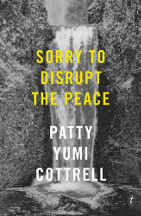Sorry to disrupt the peace Patty Yumi Cottrell

Text, 2017. ISBN 9781925498431
(Age: Senior secondary) Recommended. Helen Moran, the first person
narrator in this first novel by Patty Yumi Cottrell, lives in a
shared apartment in New York. She has a part-time job caring for
troubled young people and sees herself as an organised and
functioning member of society. However, there are signs that her
life is not as controlled as she suggests. As proof of her
competency she presents a pamphlet that she wrote purporting to give
advice on how to survive in New York. The advice includes stealing,
lying and distorting the facts. When her uncle rings with the news
that her adoptive brother has committed suicide Helen decides to
return to her adoptive parents to investigate his death. Her parents
are astounded and uneasy to see her, an odd reaction, it seems. The
reader begins to understand that Helen is not what she believes
herself to be. As she reminisces about her upbringing she reveals to
the reader a difficult and friendless childhood. In her home in
Milwaukee her behaviour indicates both euphoria and depression as
she swings from mood to mood in her search for information. There is
black humour in her extreme actions; she puts the funeral flowers in
buckets containing bleach, she eats all the cake intended for the
wake, on the way to the funeral, in the car in which her brother
killed himself, she gets a flat tyre and has to walk, so missing the
funeral. She interrogates her brother's friends in search of clues
about his decision to kill himself, but ultimately it is the
document that he has left on his computer that gives her answers,
and gives the readers more evidence about Helen herself. Her brother
felt that he could be of most use to the world by donating his
organs; he suggested in his document that he believes Helen to have
undiagnosed bipolar disorder. His reasons for dying are not totally
convincing but his understanding of his sister seems accurate.
Despite her possible disorder Helen is a perceptive commentator on
her adoptive parents' lives and the values of both her home town and
those she associates with in New York. It is also possible to see
the novel as a discussion on the difficulties of being Korean
adoptees, in this case their adopting parents offering charity but
not a lot of love, it seems. The book is written in deceptively
simple prose and so is a quick read but offers rewards to a more
sustained look. It does discuss suicide and the difficulties faced
by those with mental differences so perhaps should be recommended
with care.
Recommended for senior students.
Jenny Hamilton